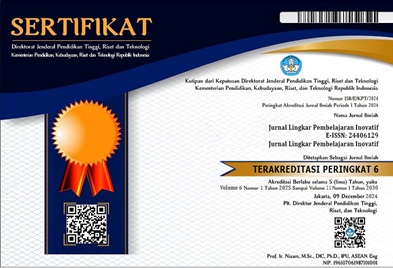ANALISIS KEBUTUHAN PENDIDIKAN DALAM PENGEMBANGAN KURIKULUM BERBASIS KOMPETENSI DI SEKOLAH MENENGAH
Kata Kunci:
Pendidikan Berkualitas, Kurikulum Berbasis Kompetensi (KBK), Sekolah MenengahAbstrak
Pendidikan yang berkualitas memerlukan kurikulum yang relevan dan adaptif terhadap perkembangan zaman serta kebutuhan peserta didik. Artikel ini bertujuan untuk menganalisis kebutuhan pendidikan dalam konteks pengembangan Kurikulum Berbasis Kompetensi (KBK) di sekolah menengah. Metode yang digunakan dalam penelitian ini adalah pendekatan kualitatif dengan teknik pengumpulan data melalui wawancara, observasi, dan dokumentasi. Hasil penelitian menunjukkan bahwa pengembangan KBK memerlukan pemetaan kompetensi dasar yang sesuai dengan karakteristik peserta didik, konteks sosial-budaya lokal, dan tuntutan dunia kerja. Selain itu, diferensiasi kurikulum yang responsif terhadap keragaman potensi dan gaya belajar peserta didik menjadi kebutuhan utama. Kesiapan guru sebagai perancang pembelajaran yang adaptif juga sangat menentukan keberhasilan implementasi KBK. Penguatan kapasitas guru, baik dalam hal keterampilan pedagogik maupun pemahaman terhadap kurikulum, menjadi kunci dalam menciptakan pembelajaran yang efektif dan relevan. Kesimpulan dari penelitian ini adalah bahwa pengembangan KBK di sekolah menengah harus melibatkan analisis kebutuhan yang mendalam, serta memberikan ruang bagi fleksibilitas kurikulum yang berfokus pada perkembangan potensi individu dan kesiapan dunia kerja. Implementasi yang efektif memerlukan kolaborasi antara pemerintah, sekolah, dan masyarakat, serta penguatan kapasitas guru melalui pelatihan yang berkelanjutan.
Quality education requires a curriculum that is relevant and adaptive to the development of the times and the needs of students. This article aims to analyze educational needs in the context of developing a Competency-Based Curriculum (KBK) in secondary schools. The method used in this study is a qualitative approach with data collection techniques through interviews, observations, and documentation. The results of the study indicate that the development of KBK requires mapping of basic competencies that are in accordance with the characteristics of students, the local socio-cultural context, and the demands of the world of work. In addition, curriculum differentiation that is responsive to the diversity of potential and learning styles of students is a primary need. The readiness of teachers as adaptive learning designers also greatly determines the success of the implementation of KBK. Strengthening teacher capacity, both in terms of pedagogical skills and understanding of the curriculum, is key to creating effective and relevant learning. The conclusion of this study is that the development of KBK in secondary schools must involve an in-depth needs analysis, as well as provide space for curriculum flexibility that focuses on the development of individual potential and readiness for the world of work. Effective implementation requires collaboration between the government, schools, and the community, as well as strengthening teacher capacity through ongoing training.





